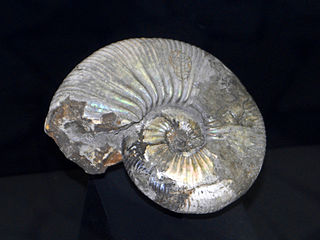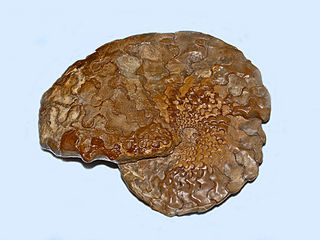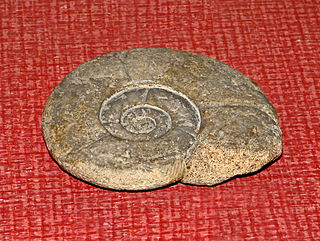
Mariella is an ammonoid genus, named by Nowak (1916) from the upper Albian and Cenomanian stages of the mid Cretaceous, included in the Turrilitidae. Its type is Turrilites bergeri

Acanthohoplites is an extinct genus of ammonites in the family Parahoplitidae that lived in the Aptian and Early Albian stages of the Early Cretaceous.

Aconeceras is an early Cretaceous ammonite included in the oppeliid subfamily Aconeceratidae, characterized by an involute, high-whorled, flat-sided shell that bears a finely serrate keel along the venter. Sutures have narrower and deeper elements than in Protaconeceras. Aconeceras has been found in western Europe, South Africa, and eastern Australia. Its stratigraphic range is from the Upper Barramian to the Lower Albian.

Barremites is an ammonoid cephalopod genus belonging to the family Desmoceratidae, that lived during the Hauterivian and Barremian stages of the Early Cretaceous.
Beudantiella is a high whorled, compressed, sparsely ribbed ammonite from the Lower Cretaceous,, found in Queensland, Australia.
Zurcherella is a Lower Cretaceous (Upper Barremian - Upper Aptian desmoceratid ammonite from France and Colombia. Its shell is moderately compressed and rather involute, with fine sinuous ribs that arise some distance above the umbilical rim. Zurcherella differs from its descendant Uhligella in that in the latter, ribs arise from the umbilical shoulder.
Uhligella is an extinct cephalopod genus from the Early Cretaceous, belonging to the ammonoid subclass and included in the Desmoceratidae.

Ceratitida is an order that contains almost all ammonoid cephalopod genera from the Triassic as well as ancestral forms from the Upper Permian, the exception being the phylloceratids which gave rise to the great diversity of post-Triassic ammonites.
Oecotraustes is an extinct cephalopod genus included in the ammonid family Oppeliidae and named by Wilhelm Waagen in 1869. Species in the genus lived during the Middle Jurassic.
Oecoptychius is an extinct genus of fossil ammonite cephalopods. The species lived during the Middle Jurassic.

Pachydiscus is an extinct genus of ammonite from the Late Cretaceous and Early Paleocene with a worldwide distribution, and type for the desmoceratacean family Pachydiscidae. The genus' type species is P. neubergicus. Altogether some 28 species have been described.

Hoploscaphites is an extinct ammonite genus from the Upper Cretaceous and the Lower Paleocene, included in the family Scaphitidae.
Syringonautilidae is a family of Nautiloidea from the middle to late Triassic. Syringonautilidae comprise the last of the Trigonoceratoidea and are the source for the Nautilaceae which continued the Nautiloidea through the Mesozoic and into the Cenozoic right down to the recent. Syringonautilidae is a strictly Triassic family, derived early in the Triassic from the Grypoceratidae.

Tissotiidae is a family of ammonites (Ammonitina) belonging to the Acanthoceratoidea.

Menuites is a genus of extinct ammonites, forming a rather small offshoot of Anapachydiscus with a fairly widespread distribution from the Upper Cretaceous Santonian and Campanian stages.
Pseudohaploceras is a genus of desmosceratid ammonites from the Early Cretaceous; Valanginian to Albian epochs.

Puzosia is a genus of desmoceratid ammonites, and the type genus for the Puzosiinae, which lived during the middle part of the Cretaceous, from early Aptian to Maastrichtian. Sepkoski defines the range from Albian to Santonian. The generic name comes from the Serbian words "Puž" (snail) and "oce/ose" (axis), gaining its name from the shell's snail-like appearance.

Ophiceras is an extinct genus of smooth, evolute ceratitid ammonites from the Griesbachian, with a rounded venter. Fossils of the genus have been found in Armenia, Azerbaijan, China, Greenland, and India.
Sturia is a genus of ceratitid ammonoids from the Lower Triassic with an ammonitic suture.

Hammatoceratidae is a family of lower and middle Jurassic ammonites included in the superfamily Hildoceratoidea.











